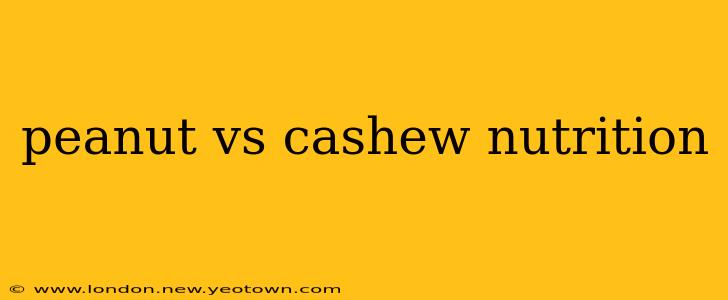Peanut vs. Cashew: A Nutritional Showdown
The crunchy, satisfying world of nuts offers a delicious array of choices, but when it comes to peanuts versus cashews, which reigns supreme in the nutrition department? Both boast impressive nutritional profiles, but their differences are significant enough to influence your snacking choices depending on your specific dietary needs. Let's delve into this nutty debate and uncover the winner in different categories. This isn't about declaring a single "best" nut, but rather understanding the unique benefits of each.
What are the main nutritional differences between peanuts and cashews?
This is a fundamental question many people ask. The short answer is: while both are good sources of protein and healthy fats, their macronutrient and micronutrient profiles differ considerably. Peanuts generally pack a bigger protein punch and more fiber, while cashews offer a higher concentration of certain vitamins and minerals like magnesium and zinc. Let's look at the specifics:
Peanuts: These legumes (technically not a true nut!) are celebrated for their high protein content, contributing to satiety and muscle building. They are also a decent source of fiber, aiding digestion and promoting gut health. Furthermore, peanuts are rich in monounsaturated fats, beneficial for heart health.
Cashews: These kidney-shaped delights stand out for their higher concentration of magnesium, essential for bone health, muscle function, and blood sugar control. They are also a good source of zinc, crucial for immune function and wound healing. Like peanuts, cashews contain healthy fats, but their fat profile differs slightly.
Which nut is higher in protein?
Peanuts win this round. A serving of peanuts generally delivers a higher amount of protein compared to an equivalent serving of cashews. This makes peanuts a more satisfying option for those seeking to boost their protein intake, whether for muscle building or general satiety.
Which nut has more fiber?
Again, peanuts take the lead. Their higher fiber content contributes to improved digestion and a feeling of fullness, which can be particularly beneficial for weight management.
Which nut is better for heart health?
Both peanuts and cashews offer heart-healthy monounsaturated fats. However, the specific fatty acid composition differs slightly. While a definitive "better" nut is hard to declare without considering individual needs and overall diet, both contribute positively to cardiovascular health when consumed as part of a balanced diet.
Which nut is a better source of magnesium?
Cashews emerge victorious here. Their magnesium content significantly surpasses that of peanuts, making them a valuable addition to a diet focused on bone health and overall well-being.
Which nut is a better source of zinc?
Similar to magnesium, cashews provide a more substantial amount of zinc compared to peanuts. This makes cashews a beneficial choice for supporting immune function and wound healing.
Are there any allergy concerns?
Both peanuts and cashews are common allergens. It's crucial to be aware of any potential allergies before incorporating either nut into your diet. Always check food labels carefully and consult with an allergist if you have concerns.
Conclusion:
The "better" nut truly depends on your individual needs and preferences. Peanuts excel in protein and fiber content, while cashews shine with their higher levels of magnesium and zinc. The best approach is to include both peanuts and cashews as part of a varied and balanced diet to reap the benefits of both. Enjoy the crunch, and savor the nutritional richness of these delightful nuts!

